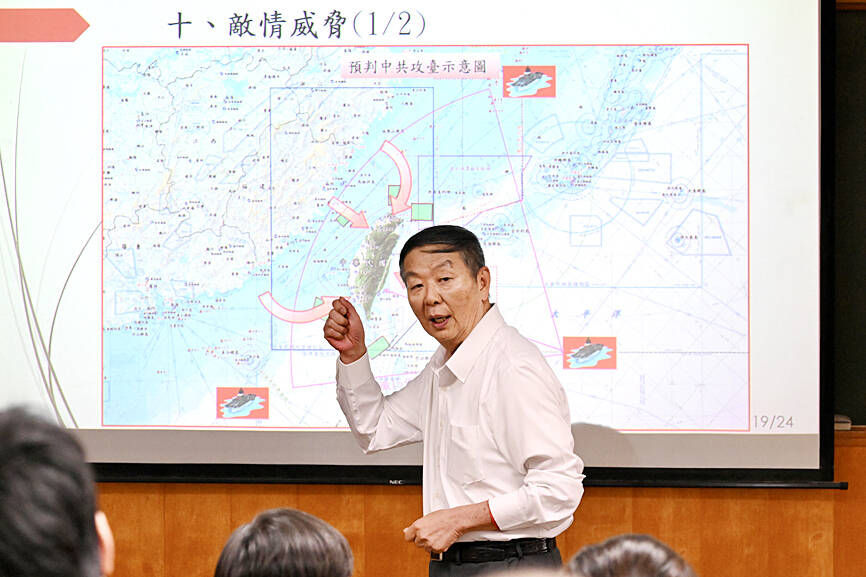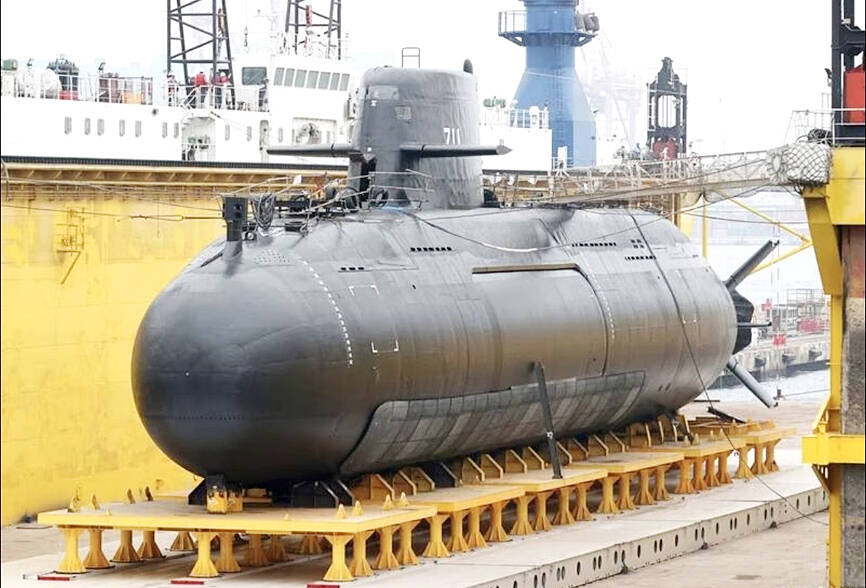Admiral Huang Shu-kuang’s (黃曙光) resignation as head of the Indigenous Submarine Program and as a member of the National Security Council could affect the production of submarines, a source said yesterday.
Huang in a statement last night said he had decided to resign due to national security concerns while expressing the hope that it would put a stop to political wrangling that only undermines the advancement of the nation’s defense capabilities.
Taiwan People’s Party Legislator Vivian Huang (黃珊珊) yesterday said that the admiral, her older brother, felt it was time for him to step down and that he had completed what he set out to do.

Photo: George Tsorng, Taipei Times
The resignation also coincides with the handing off of President Tsai Ing-wen’s (蔡英文) administration to the in-coming administration of president-elect William Lai (賴清德), Vivian Huang said.
Huang Shu-kuang recently filed defamation lawsuits against media personalities demanding NT$2 million (US$61,557) in damages over allegations of corruption during his time overseeing the submarine project.
Under the admiral’s watch, the nation’s first domestically made submarine, the Hai Kun (海鯤), or Narwhal, was launched in Kaohsiung in September last year. It is undergoing harbor acceptance tests.

Photo: Lee Hui-chou, Taipei Times
CSBC Corp, Taiwan (台船) chairman Cheng Wen-lon (鄭文隆) last month said that the nation’s first domestically built submarine would be ready for delivery by the deadline of Nov. 3 next year.
Huang Shu-kuang’s plan was to stagger the production of seven indigenous submarines over three phases: three in the first phase, including the Hai Kun prototype and two others, followed by a final batch with performance upgrades.
The source said that during an internal meeting, Lai asked that production funding for the submarines be provided in full in one budget.
However, with Huang Shu-kuang’s exit, the Ministry of National Defense and Navy Command Headquarters would take over the project, which would change production timelines, the source said.
Navy Commander Tang Hua (唐華) has other opinions regarding the construction of a naval force and improving combat readiness, such as the planned littoral combatant command, they said.
According to the navy, the command would control the Hai Feng Shore Based Anti-ship Missile Group, a unit of speedboats armed with anti-air and surface-to-surface missiles, and maritime surveillance. The command would oversee all defense-related affairs within 24 nautical miles (44.4km) of the coast.
Tang has also commented on submarine production, saying that their manufacture, equipment and functions, and strategic deployment should be based on the combat environment that Taiwan might face.
That could require new thinking on how submarines would be deployed, the source said.
Whether Tang’s opinions on the program would align with National Security Council Deputy Secretary-General Wellington Koo’s (顧立雄) vision or would receive the support of Lai, depends on the who is in the Cabinet after the presidential inauguration on May 20, the source said.
Additional reporting by Lee Wen-hsin

PREPAREDNESS: Given the difficulty of importing ammunition during wartime, the Ministry of National Defense said it would prioritize ‘coproduction’ partnerships A newly formed unit of the Marine Corps tasked with land-based security operations has recently replaced its aging, domestically produced rifles with more advanced, US-made M4A1 rifles, a source said yesterday. The unnamed source familiar with the matter said the First Security Battalion of the Marine Corps’ Air Defense and Base Guard Group has replaced its older T65K2 rifles, which have been in service since the late 1980s, with the newly received M4A1s. The source did not say exactly when the upgrade took place or how many M4A1s were issued to the battalion. The confirmation came after Chinese-language media reported

The Taiwanese passport ranked 33rd in a global listing of passports by convenience this month, rising three places from last month’s ranking, but matching its position in January last year. The Henley Passport Index, an international ranking of passports by the number of designations its holder can travel to without a visa, showed that the Taiwan passport enables holders to travel to 139 countries and territories without a visa. Singapore’s passport was ranked the most powerful with visa-free access to 192 destinations out of 227, according to the index published on Tuesday by UK-based migration investment consultancy firm Henley and Partners. Japan’s and

A Ministry of Foreign Affairs official yesterday said that a delegation that visited China for an APEC meeting did not receive any kind of treatment that downgraded Taiwan’s sovereignty. Department of International Organizations Director-General Jonathan Sun (孫儉元) said that he and a group of ministry officials visited Shenzhen, China, to attend the APEC Informal Senior Officials’ Meeting last month. The trip went “smoothly and safely” for all Taiwanese delegates, as the Chinese side arranged the trip in accordance with long-standing practices, Sun said at the ministry’s weekly briefing. The Taiwanese group did not encounter any political suppression, he said. Sun made the remarks when

BROAD AGREEMENT: The two are nearing a trade deal to reduce Taiwan’s tariff to 15% and a commitment for TSMC to build five more fabs, a ‘New York Times’ report said Taiwan and the US have reached a broad consensus on a trade deal, the Executive Yuan’s Office of Trade Negotiations said yesterday, after a report said that Washington is set to reduce Taiwan’s tariff rate to 15 percent. The New York Times on Monday reported that the two nations are nearing a trade deal to reduce Taiwan’s tariff rate to 15 percent and commit Taiwan Semiconductor Manufacturing Co (TSMC, 台積電) to building at least five more facilities in the US. “The agreement, which has been under negotiation for months, is being legally scrubbed and could be announced this month,” the paper said,